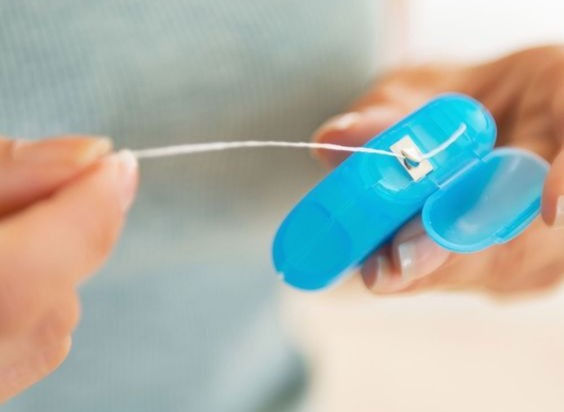How to do daily Flossing| Dental Floss| Flossing Teeth
- Dr Abi
- Apr 14, 2023
- 4 min read
Updated: Jul 15, 2023

Flossing is an important part of oral hygiene and can help remove plaque and food particles from between your teeth that your toothbrush may not reach.
Dental Plaque
Dental plaque is an adherent bacterial biofilm that forms on the hard surfaces of teeth, restorations, and other oral structures.
Dental plaque is defined as a "soft, sticky, colorless to pale yellow biofilm that forms on the teeth and other hard surfaces in the oral cavity." It is composed of bacteria, bacterial byproducts, food debris, and saliva.

Dental plaque is constantly forming on the surfaces of teeth and gum lines, and if it's not removed daily through proper oral hygiene practices such as brushing and flossing, it can lead to tooth cavities, gum problems, and other oral health problems.

Steps to learn how to floss:
1. Start by breaking off about 18 inches of floss from the dispenser.

2. Wind most of 18 inches of floss around one of your middle fingers, and the rest around the same finger on the opposite hand. This will leave about an inch or two of floss to use.


3. Hold the floss between your thumbs and forefingers, and gently move it in between your teeth doing a back-and-forth motion (Zig-Zag).



4. Curve the floss around the base of each tooth in a C-shape, making sure to go beneath the gum line. Gently slide the floss up and down against the side of each tooth.


5. Gently pull out the floss in a zig-zag way. Use a clean section of floss for each tooth, and remember to floss both sides of each tooth.


6. Clean all the teeth with the floss gently. When you're done, rinse your mouth with salt water or anti-bacterial mouthwash to remove any loosened debris.

7. Discard the used floss. Do Flossing daily after meals.

It may take some practice to get comfortable with flossing, but with regular practice, it will become easier and more effective. Flossing should be done at least once a day, preferably before bedtime, to help prevent gum disease and tooth decay.
advantages of flossing
Flossing has several advantages that can help improve oral health.
Removes plaque and food debris: Flossing helps to remove plaque and food particles that can get stuck in between teeth where your toothbrush can't reach. So, tooth decay and gum disease are prevented.
Reduces the risk of gum disease: Gum disease is caused by the buildup of plaque and bacteria around the gum line. Flossing helps to remove these harmful substances, reducing the risk of developing gum disease.
Prevents bad breath: Flossing can help to remove bacteria and food particles that can contribute to bad breath.
Saves money on dental treatments: By maintaining good oral health through regular flossing, you can reduce the risk of developing dental problems that require expensive treatments such as fillings, crowns, and root canals.
Improves overall health: Poor oral health has been linked to several systemic health conditions such as heart disease, diabetes, and stroke. Flossing can help improve oral health, which in turn can contribute to overall health and wellbeing.
In summary, flossing is an essential part of maintaining good oral health and has several benefits that can help prevent dental problems and improve overall health.
FREQUENTLY ASKED QUESTION about dental floss |Flossing teeth
How often should I floss my teeth?
It is advised to floss at least once a day, most likely before bedtime. However, if you have a higher risk of developing dental problems, your dentist may recommend that you floss more frequently, such as after every meal.
Can flossing cause my gums to bleed?
It is possible for flossing to cause your gums to bleed, especially if you have not flossed regularly or if you are flossing too aggressively. When you first start flossing, it's normal for your gums to bleed a little bit as they get used to the pressure and stimulation.
Is there an age limit to flossing?
No, there is no age limit to flossing. Flossing is an important part of maintaining good oral health and preventing dental problems such as tooth decay and gum disease, and it can benefit people of all ages. In fact, as people age, they may become more susceptible to dental problems such as gum disease, so it's especially important to maintain good oral hygiene habits, including flossing, as they get older.
Author-

Dentist
10 + years of experience
Certification in Practical Implantology
Certification in Rotary Endodontics
Associate Fellowship in Laser Dentistry Certification in Laser Treatments Diploma in Practical Occlusion and Restorative Dentistry Course Advanced occlusion appliance therapy, TMD Comprehensive Course in Veneers - Ceramic & Composite Aesthetic Certified - Europe, Germany WHO Health Program Certified Certification in Laser Dentistry Fellow of the Academy of General Education (FAGE) Member of the Indian Dental Association (IDA)

Contact Us
Dr Abi Platinum Dental & Multispecialty Clinic
DENTAL || IMPLANTS || SKIN || LASERS|| HAIR
website - www.platinumdentalcentre.co.in
email me - doctorabi007@gmail.com
contact - 8791864036, 9560223554
Plot 9 Kaling Marg Sector 5 Vaishali, Sector 4 Vaishali, Ghaziabad UP 201012
Copyright © 2023 Dr. Abi Negi. All rights reserved.



Comments